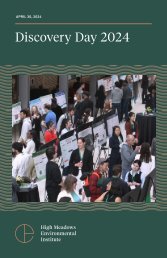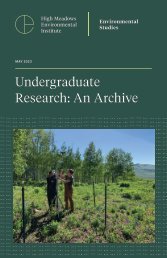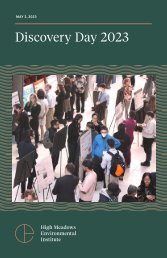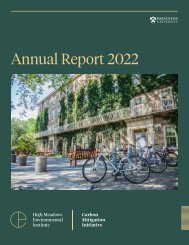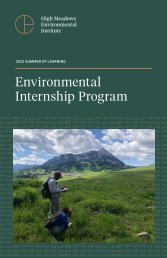CMI Annual Report 2021
You also want an ePaper? Increase the reach of your titles
YUMPU automatically turns print PDFs into web optimized ePapers that Google loves.
Improving Forecasts of How Biodiversity Responds<br />
to Climate Change<br />
PRINCIPAL INVESTIGATOR: JONATHAN LEVINE<br />
At a Glance<br />
To accurately assess the biodiversity benefits of slowing<br />
climate change through land-based climate solutions, the<br />
Levine group is challenging key mathematical assumptions in<br />
the leading biogeographic modeling tools for forecasting<br />
biodiversity response to climate and developing solutions<br />
critical for their accurate implementation. Reliably gauging<br />
the impact of mitigation initiatives on biodiversity is vital to<br />
current bp efforts towards a sustainable energy world.<br />
Research Highlight<br />
Land-based climate solutions have great potential to slow<br />
climate change and will thereby benefit global biodiversity.<br />
Countering this benefit, however, are the biodiversity impacts<br />
of the land use change associated with some of these solutions,<br />
including for example, afforestation or bioenergy with carbon<br />
capture. Weighing the costs and the benefits of land-based<br />
climate solutions for global biodiversity therefore requires<br />
accurate predictions of how climate change impacts<br />
biodiversity.<br />
“Species distribution models” are ecologists’ best tools for<br />
forecasting biodiversity responses to climate change. They<br />
underlie nearly all research quantitatively predicting global<br />
biodiversity under a future climate. These models take known<br />
occurrences of a given species today, align those occurrences<br />
with current climate and other environmental variables, and<br />
then explore how the species’ distributional range will shift<br />
with changing climate variables.<br />
Researchers can predict how the diversity of species at each<br />
geographic location changes with future climate when this<br />
approach is repeated for many taxa. As powerful as these<br />
approaches are, research in the Levine group has shown that<br />
key mathematical assumptions in these models are<br />
undermining our ability to draw meaningful conclusions,<br />
leading to erroneous estimates of biodiversity responses to<br />
climate change.<br />
Carbon Mitigation Initiative Twenty-first Year <strong>Report</strong> <strong>2021</strong> 38





